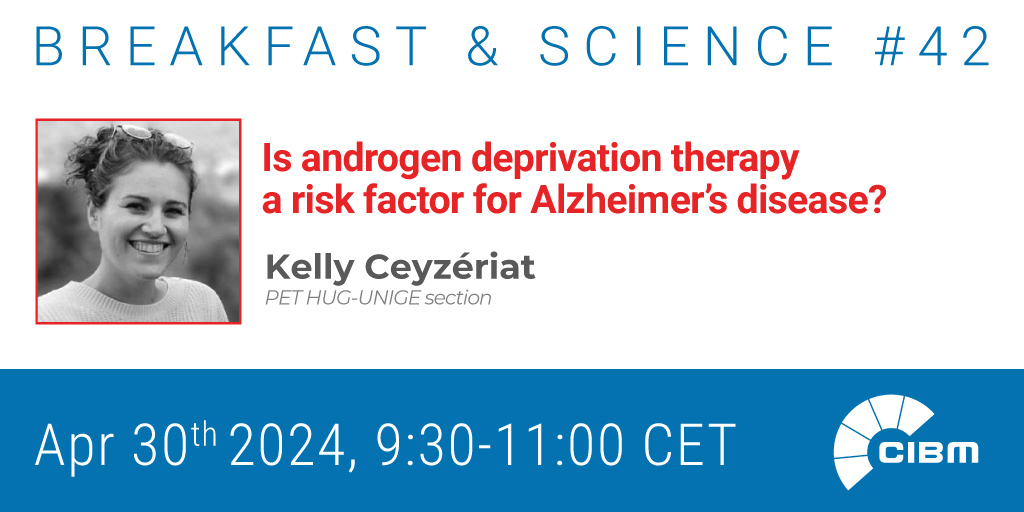
On the 30th of April 2024, the 42nd CIBM Breakfast & Science Seminar was given by Kelly Ceyzériat, CIBM PET HUG-UNIGE Section. The event was chaired by Valentina Gariboto, Head of the CIBM PET HUG-UNIGE Molecular Imaging Section.
Is androgen deprivation therapy a risk factor for Alzheimer’s disease?
Abstract
Androgen deprivation therapy (ADT) is one of the standard treatments for intermediate- and high-risk localized or locally advanced prostate cancer. Emerging studies suggest that ADT may be related with a higher risk to develop cognitive disorders such as Alzheimer’s disease. Those suspicions are essentially based on observational cohort studies and the causal mechanisms for this increased risk are not well understood.
In our project, we use TgF344-AD rats as a model of Alzheimer’s disease to investigate the effect of androgen deprivation on Alzheimer’s disease biomarkers thanks to in vivo brain PET imaging. To go further in the cellular mechanisms modulated by the ADT, postmortem analyses are ongoing.
First results showed that ADT does not modulate amyloid load and neuroinflammation. However, a preliminary analysis suggests that it increases brain metabolism alterations in AD rats.
This project will bring important knowledges to better understand the relationship between androgen suppression and development of Alzheimer’s disease, with the aim to optimize the treatment management and treatment-related side effects of prostate cancer patients undergoing ADT.
Kelly Ceyzériat,
Research Staff Scientist, CIBM PET HUG-UNIGE Molecular Imaging Section
About the speaker
During her PhD (Group of Dr Carole Escartin, Molecular Imaging Center, Paris-Saclay University, France), she underlined the importance and complexity of astrocyte functions in Alzheimer’s disease (AD), using innovative tools based on viral vectors in combination with behavioral and imaging studies. In 2018, she integrated the group of the Prof Valentina Garibotto (Division of nuclear medicine and molecular imaging, HUG) to manage a collaborative and translational project that aims at evaluating the therapeutic potential of low-dose radiation therapy for AD. In 2021, she studied the involvement of glial cells in the overexpression of the 18kDa translocator protein (TSPO), a marker of neuroinflammation classically used in molecular imaging, in the group of Prof Philippe Millet (Psychiatry department, HUG). In January 2022, she joined the CIBM (PET HUG-UNIGE section) to investigate the mechanisms of onset and progression of AD pathology, with specific interest in hormonal and neuroinflammatory modulators.

